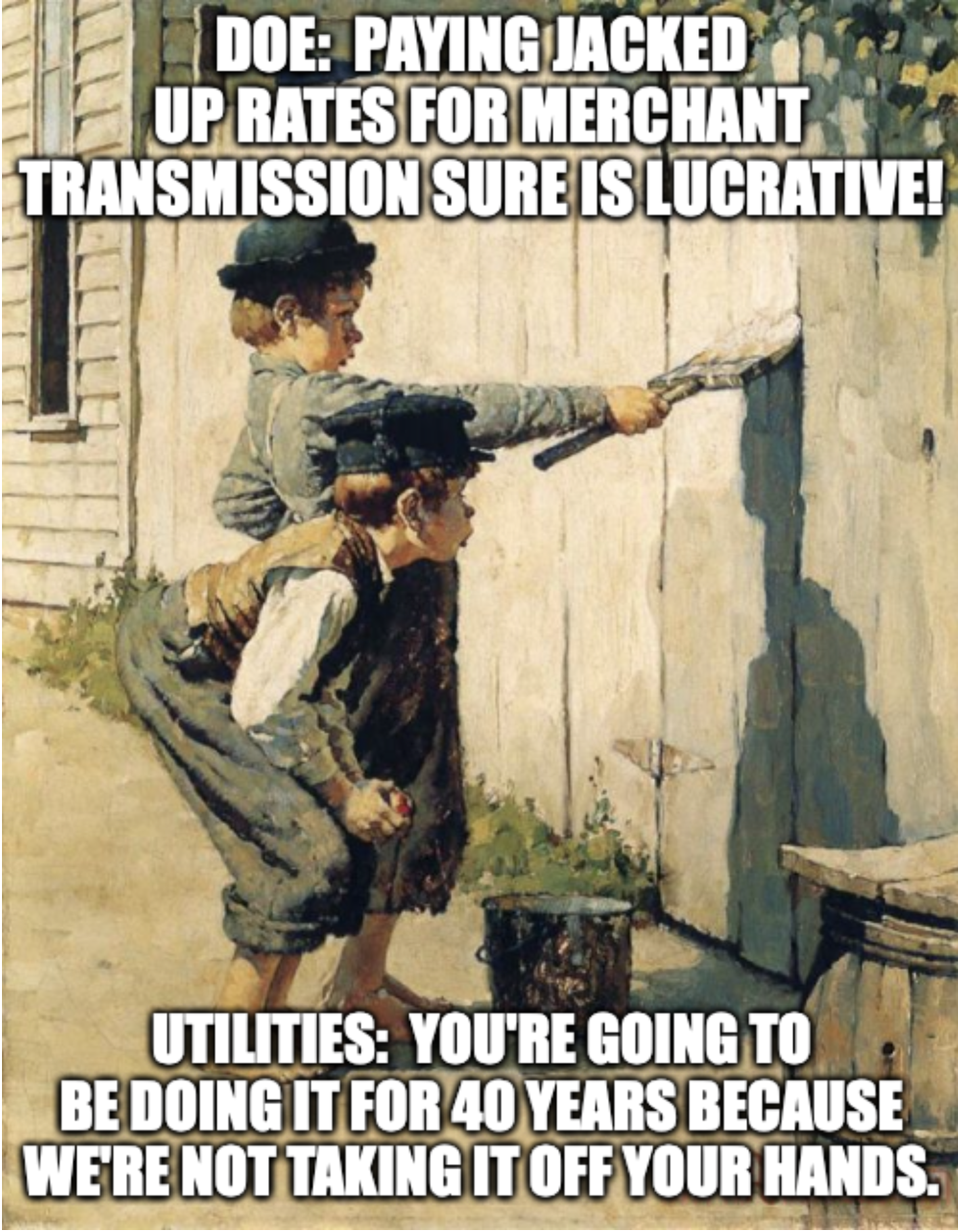Many of you are familiar with how merchant transmission operates if you've been reading this blog. Unfortunately, Congress, DOE and the mainstream media have no idea. No idea at all. Congress included a provision in the IIJA (Infrastructure Investment and Jobs Act aka Bipartisan Infrastructure Bill) that grants DOE the ability to borrow up to $2.5B to facilitate construction of new transmission. One of the new authorities allows DOE to enter into capacity contracts with transmission developers for up to 50% of the project's capacity for a period of up to 40 years. These contracts provide taxpayer-funded revenue for merchant transmission developers that is supposed to enable them to get loans necessary for construction. Congress and DOE think that the government's support will "encourage" other customers to sign up and that DOE can escape without spending any money before the project goes into operation.
Once negotiated rate authority is granted, the developer must make broad announcement that it is selling capacity so that every interested entity gets an equal chance to bid on capacity. The developer can then negotiate with respondents based on criteria that would be approved by FERC. If you want to make up your own criteria without FERC approval you introduce uncertainty that it may not be approved after the fact. FERC requires the applicant to accept all market risk for its project. This means NO CAPTIVE CUSTOMERS who would be required to pay for a project, such as U.S. taxpayers.
The basic premise of negotiated rates is that the market rate for transmission capacity serves as a cap to keep rates negotiated just and reasonable. Nobody is going to pay more for merchant transmission capacity than they can pay for transmission capacity elsewhere. However, DOE selecting a merchant project and promising them a capacity contract for the express purpose of providing enough revenue to get the project financed is not competitive. While DOE pretends it will only pay "market" prices, where's the market? Where's the competition? And why is DOE's negotiation taking place completely outside any open season negotiations with other utilities?
Of the three projects guaranteed capacity contracts, only one has approved negotiated rate authority from FERC. That project received authorization in 2015 but never completed the steps to have its negotiated rates approved by FERC. Probably because it couldn't find any customers. That company is going to have to start fresh because its whole project, corporate structure and investors have changed.
But DOE's announcement says it will have its contracts that commit to buying capacity before the project begins construction in place early next year. How could that be fair? What other entities are being offered capacity on these projects at this time? How does DOE know that it even needs to enter these contracts if the project has not yet offered its service to the market? This whole scheme doesn't work and makes little sense.
DOE thinks that just by announcing it will buy capacity on transmission projects that it will create a flurry of interest in the projects. DOE Pollyanna believes that it won't actually have to spend any money because customers are going to be chomping at the bit to buy capacity from the selected projects. We're not painting Tom Sawyer's fence here. If merchant capacity was a good deal for utilities, they would buy it in the first place without DOE's encouragement. If it's not, they're still not buying it. In that case, the DOE is stuck using taxpayer funds to pay for a transmission project that nobody will ever use for 40 YEARS. In addition, it is likely that DOE will overpay for capacity and make the project even less cost effective. The only way DOE is going to get out of these unnecessary capacity contracts is to give the capacity away. Taxpayers are still out the cost of the overpriced contract for 40 years, with only pennies on the dollar recovered.
The DOE seems to be counting on an ignorant media to spread the word about this program. The stories are so completely ignorant that I'm not even going to comment on any particular one. Ignorant eco-warriors and poor little rich kids who moonlight as annoying climate activists don't buy capacity on merchant transmission. The only entities that would buy capacity are sophisticated utilities that probably think the DOE is dumber than I do. This program is on the fast track to failure.
DOE is buying something that it doesn't need and won't ever use, but will put a lot of money in the pockets of private investors who otherwise would have no buyers for their overpriced service. Can I just say "I told you so" in advance? This program is wasteful, illogical, and unfair.
Merchant transmission is a market-based alternative to regionally planned cost-of-service transmission necessary for reliability, economic, or public policy reasons. There is no actual need for merchant transmission. It's strictly for profiteers who think they can fill a need that market participants will pay for. When there is no market need for merchant transmission, it fails. This new program is supposed to prevent these merchants from failing due to lack of market need. Why are taxpayers paying for this speculative profiteering when they are also paying for the regionally planned projects they actually need to keep their lights on? Giving DOE a pot of money with which to undermine our transmission planning and ratemaking system is simply adding layers of chaos that will ensure that nothing beneficial is ever constructed.

 RSS Feed
RSS Feed